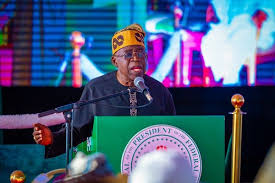The Nigerian Government says it is injecting N2 trillion into the economy in the next six months in line with its review of the accelerated stabilisation and advancement plan.
Nigerian President Bole Tinubu, who inaugurated a 31-member Presidential Economic Coordination Council at the Aso Rock Villa, Abuja, on Thursday said that his administration was determined to, in the next few months, increase crude oil production to two million barrels per day and generate more electricity for Nigerians.
He described Nigeria’s current power generation and crude oil production as’ shameful’.
“As a nation, it is so shameful that we have about 4.5 gigawatts. We must increase our oil production too to 2 million barrels per day within the next few months. Remove all barriers hindering investments into the sector to enhance competitiveness. We’ve had a challenge thrown at us and all of us will have to be careful.
The report by the Punch newspaper on Friday said that the committee comprises President Tinubu, Vice President Kashima Shettima, Senate President Godswill Akpabio, the Chairman of the Nigerian Governors Forum, Governor Abdulrahman Abdulrazaq of Kwara State and the Governor of the Central Bank of Nigeria Governor, Yemi Cardoso.
It added that the PECC also comprises 13 persons drawn from the organised private sector, including the Chairman of Dangote Group, Aliko Dangote; UBA Chairman, Mr. Tony Elumelu; BUA Founder, Abdulsamad Rabiu, among others, who would serve on the Council for one year.
However, despite being Africa’s largest oil producer, Nigeria has recently struggled to meet its OPEC production quotas.
The Nigerian government has blamed challenges such as pipeline vandalism, oil theft and operational inefficiencies for the persistent shortfalls.
For instance, in May 2024, crude oil production averaged only 1.25 million barrels per day, well below its OPEC+ quota and the government’s target of 1.7 million bpd for budgetary purposes.
Similarly, Nigeria’s power generation capacity has remained critically low—4.5 gigawatts- which is inadequate for the industrial needs of its over 200 million citizens. This has contributed to frequent power outages and stifling economic productivity.
Reacting to the inauguration of the Presidential Economic Coordination Council, some Nigerian economists said that such a move might not yield the desired results,
They quickly pointed out that a similar advisory council was established by the administration of former President Muhammadu Buhari, when he assembled a team of notable Nigerian economists and industrialists, but not much was achieved.
GIK/APA
Nigeria govt to inject N2tn into new economic revival scheme

Previous ArticleWorld Bank supports Moroccan institutional reforms

